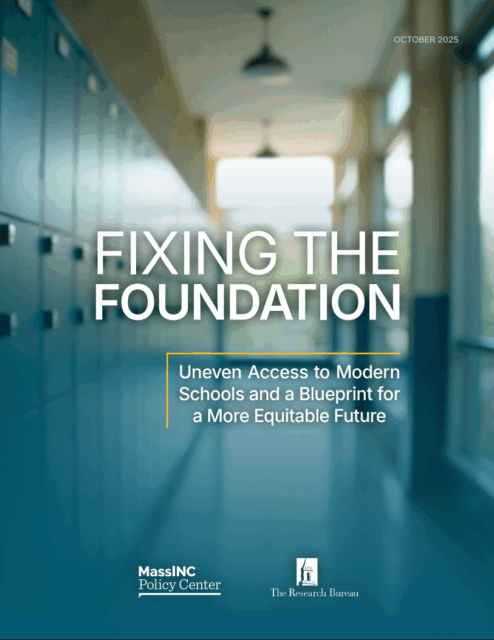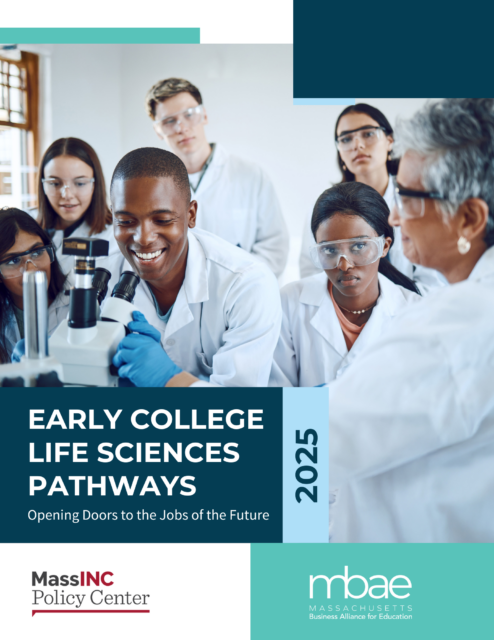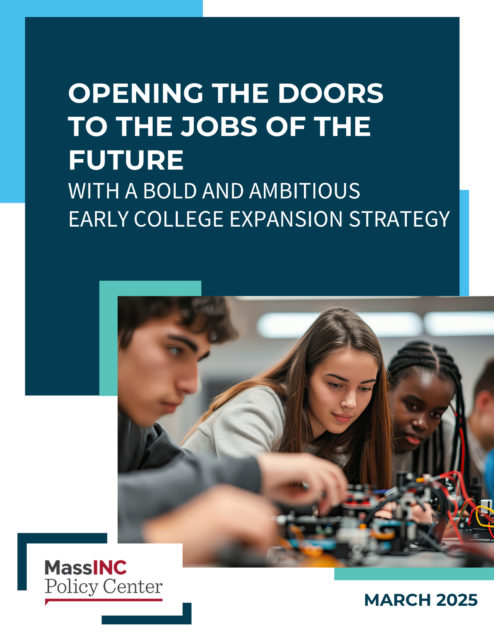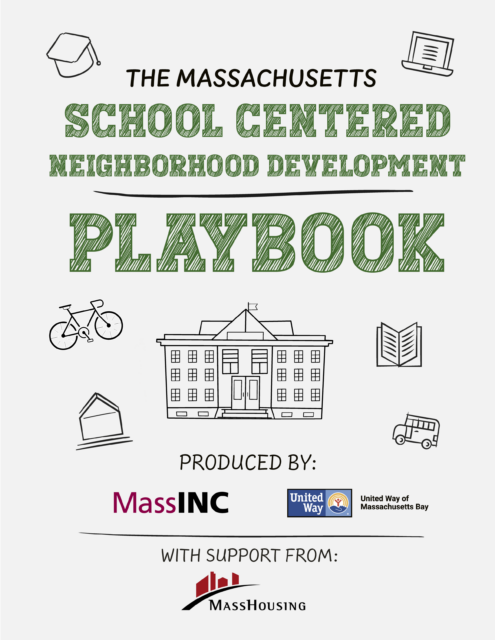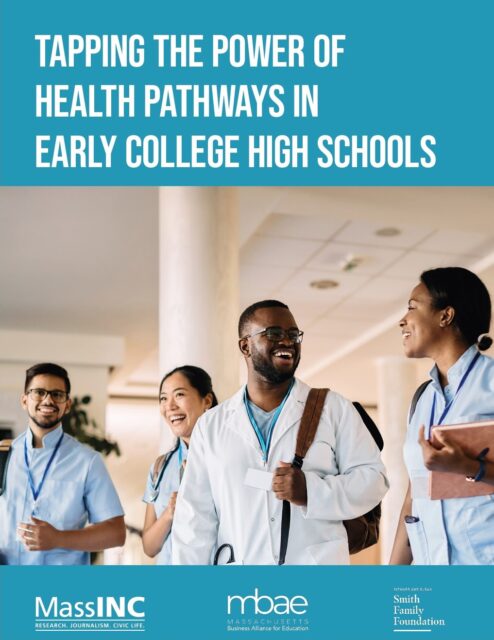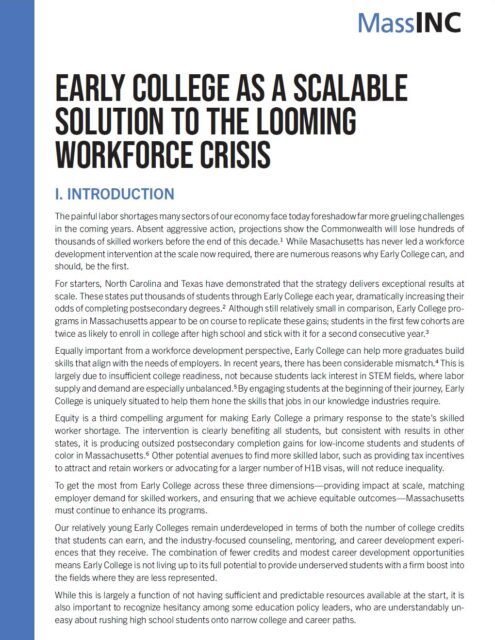Education Research
Browse research releases from the MassINC Policy Center.
-
Case Study: Teach Western Mass
Vital lessons for systems change initiatives seeking to solve education equity challenges.
December 12, 2025
- Teach Western Mass (TWM) built culturally responsive training and recruitment programs that expanded access to teaching and increased educator diversity in Holyoke and Springfield.
- In partnership with school districts, colleges and universities, and the state education agency, Teach Western Mass helped elevate educator workforce and diversity as a shared regional priority.
- TWM’s early ambitions to change systems to expand the regional educator pipeline delivered impact, but limited capacity ultimately required the organization to focus on its teacher residency training program.
- This case study underscores the challenges that small nonprofits face mounting long-term system-change efforts.
-
Fixing the Foundation: Uneven Access to Modern Schools and a Blueprint for a More Equitable Future
This report examines disparities in school facility conditions across Massachusetts and their implications for student learning.
October 7, 2025
- Nearly 60% of Massachusetts’ lowest-rated or over-capacity schools are located in Boston or a Gateway City.
- At the current pace, it could take 50 years to replace or renovate all high-need school buildings in Massachusetts.
- Suburban districts received 57% of major MSBA Core Program grants since 2015, while Boston and Gateway Cities received less than 19%.
-
Early College Life Sciences Pathways
Expanding Early College access and strengthening career-connected learning are critical to ensuring Massachusetts maintains a competitive, skilled workforce. This report outlines four key objectives to guide an expansion strategy that state leaders are currently developing.
March 3, 2025
- Early college is Massachusetts’ most systemic and impactful effort to increase college access and success. Marrying this educational equity strategy with industry-led efforts to grow the life sciences workforce will deliver stronger results on both fronts.
- Building robust Early College life sciences pathways is a difficult and complex undertaking that requires strong industry involvement. At present, the industry has very little awareness of the state’s Early College strategy, and there has been no formal effort to engage the sector in the state’s ambitious Early College initiative.
- With the Massachusetts Early College Initiative conducting its first strategic plan and the state’s Life Sciences 3.0 economic development package signed into law, the coming months will be decisive. The actions leaders take to enable the growth of Early College life sciences pathways will heavily influence the ability of Massachusetts students to participate fully in this cutting-edge industry for years to come.
-
Opening the Doors to the Jobs of the Future
Expanding Early College access and strengthening career-connected learning are critical to ensuring Massachusetts maintains a competitive, skilled workforce, and this report outlines four key objectives to guide the state's expansion strategy.
March 3, 2025
- Massachusetts must significantly expand Early College programs to reach more low-income students, as current enrollment remains too limited to make a substantial impact. The state should prioritize high-potential high schools and utilize hybrid or online learning models to ensure accessibility, particularly for students in rural areas.
- Current Early College programs lack structured connections to high-demand industries like health and STEM. A more robust program should integrate specialized advising, career development experiences, and credit accumulation targets, while also aligning Early College with Innovation and Career Pathway (ICP) programs.
- Expanding Early College to middle-income students can create more diverse learning environments, strengthen urban schools, and support high school redesign in smaller districts. Targeted strategies include regional partnerships, urban magnet schools, and enrollment goals that promote integration in Boston and the Gateway Cities.
- Sustainable Early College expansion will require clear governance structures, accountability measures, and administrative capacity. Some necessary policy changes will need to be addressed through board decisions, legislation, and budget appropriations.
-
The Massachusetts School Centered Neighborhood Development Playbook
Neighborhood vitality and public school performance are closely linked, yet education improvement efforts are generally siloed from planning, housing, and community development.
October 9, 2024
- Growing education reform movements and an influx of housing resources provide a window to embrace coordinated planning efforts at the neighborhood level
- The funding of backbone organizations and the implementation of the Community School model are both effective ways to work across silos and create mixed-income neighborhoods and schools
-
In Pursuit of Greatness
Bold Strategies to Grow a Strong and Diverse Educator Workforce
February 5, 2024
- Despite strong growth in the number of teachers of color hired in Massachusetts, student diversity has increased faster, leading to a larger gap in representation that will continue to grow if left unaddressed
- Closing gaps in college access through Early College programs, adopting multiple approaches to licensure, and launching apprenticeship programs would strengthen pathways for teachers of color
-
Connected Communities
Providing Affordable Housing Residents with Unfettered Access to Digital Opportunity in Massachusetts
October 13, 2023
- Directing available federal digital equity funding to affordable housing developments is an effective way to close the digital divide
- While affordable housing developers may face challenges in retrofitting older buildings and navigating state procurement laws, broadband deployment can be streamlined by bulk purchasing design and construction services, as well as by creating a unified procurement framework for public investment
-
Tapping the Power of Health Pathways in Early College High Schools
May 23, 2023
- The health care industry faces serious staffing issues, and Early College is a promising workforce development intervention, doubling the likelihood that students enroll and persist in college
- Early College programs that are academically robust, preparing students for selective clinical programs and allowing students to earn an associate degree in high school, will create strong health pathways
-
Early College as a Scalable Solution to the Looming Workforce Crisis
May 23, 2023
- Massachusetts is predicted to lose hundreds of thousands of skilled workers by the end of the decade, absent any action
- Early College is a promising workforce development intervention due to its scalability, ability to align graduate skills with employer needs, and outsized postsecondary completion gains for low-income students and students of color
-
Getting Question 1 Right: Investment Options for Equity in Public Higher Education
May 2, 2023
- Higher education no longer provides an equitable path to upward mobility, and conditions will worsen without strategic investments
- Using the funding from Question 1 towards need-based grants and cost of living stipends, the MassReconnect program, Early College programs, and competitive faculty pay will help to create equitable pathways

